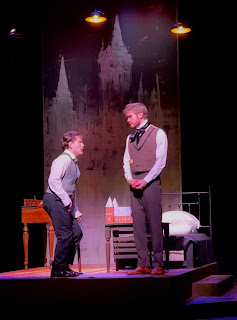What’s the Elephant in the Room?
By Tom Wachunas
…But God chose the foolish things of the world to
shame the wise; God chose the weak things of the world to shame the strong. 1Corinthians
1:27
“…Although what happens when the “holy fool” begins to
be corrupted by the world? He can no longer exist in it…” – Craig
Joseph
THEATRE: The Elephant Man, written by Bernard Pomerance,
directed by Craig Joseph / at the Mary J. Timken Theatre, located in
the Fine Arts Building on the campus of Kent State University at Stark, 6000
Frank Ave NW, North Canton, Ohio / Performances on Friday and Saturday (Feb. 3,
4) at 7:30 p.m., and Sunday Feb. 5 at 2:00 p.m.
Tickets for all performances may be purchased online 24
hours a day at www.playersguildtheatre.com.
Box Office: 330.244.3224.
Open this link to view digital program book:
https://stagemag.broadwayworld.com/modern/THE-ELEPHANT-MAN-The-Players-Guild-Theatre-23759
Bernard Pomerances’
powerful 1977 play tells the tale of John Merrick, a 19th century English man
so grotesquely deformed that he became a circus sideshow curiosity. Making
Merrick “more human, more like us” was an all-consuming mission for surgeon
Frederick Treves. He befriended Merrick and provided a home for him in London Hospital,
safely away from public gawkers.
As Craig Joseph so astutely observed in his
digital Director’s Notes (link posted above), the play is a deep consideration
of the conflicted motives, and flawed expectations by which we measure being authentically
human, ‘normal’, or beautiful. The story, as Joseph puts it, “…
suggests that human-made indicators of “civilization” - Religion, Medicine,
Commerce, Art, Law - actually deform and distort our humanity from being its
best.”
All eight members
of the cast are remarkably gifted performers, which makes for an ensemble of
brilliant versatility. Six of the eight play more than one character with
impressive panache. For example, in the role of Ross, greedy manager of the
travelling freak show, Matthew Heppe is chillingly crass. As the well-intentioned
Bishop How, on the other hand, he’s an eager and gentle religion teacher.
Natalie Sander Kern plays Carr Gomm, hospital
administrator, with credible dignity and authority. Erin Moore is Nurse Snork,
who is severely reprimanded for sneaking into Merrick’s room just to stare at
him. Rosie Bresson, playing Miss Sandwich, gushes with confidence that she will
be hired to be Merrick’s caretaker, only to quickly bolt from the room, terrified
after actually laying eyes on him. These three cast members also play some of
the privileged dignitaries visiting Merrick in his room. Additionally, they’re strangely electrifying as a bizarre carnival
trio of the slow-minded “Pinheads” - victims
of a head deformity known as microcephaly. Meanwhile, Shani Ferry’s portrayal
of Mrs. Kendal is quite compelling. Mrs. Kendal is a proud, self-possessed
stage actress who introduces Merrick to the world of high society (and feminine
anatomy), even as she struggles with her own superficiality and emerging
compassion.
Woven into
Pomerance’s writing is a generous dose of pathos, beautifully translated here
by both Michael Glavan as Frederick Treves, and Henrick Sawczak as John
Merrick. Over time, the relationship dynamic between the two characters seems
to devolve from real tenderness - tempered by Treves’ insistence that Merrick understand
certain rules of etiquette and other “standards” of societal thinking - into a
volatile crisis of conscience. Glavan’s performance is wholly captivating as we
watch his confidence dwindle into frustration, then anguish, over Merrick’s
deteriorating condition amidst questions about God, suffering, science, and human
dignity.
Sawczak’s presentation of Merrick is among the
most impassioned and intense performances I’ve ever seen on a local stage. True
to the playwright’s instruction for the character to have no prosthetic costume
or makeup, Sowczak presents Merrick’s deformity in the form of speech stutters
from contorted lips; an awkward, elongated gait; a paralyzed hand; twisted neck
and torso; and nervous eyes that can nonetheless focus with startling sharpness
as he speaks his agile, questioning mind. None of these deftly articulated
quirks interferes with the searing clarity of his words. His tone has an uncanny
range that effectively communicates disarming honesty, wit, and wisdom, along
with an acute sense of sarcasm.
One of the play’s most striking metaphors evolves as we
watch Merrick one-handedly construct an artful model of St. Philip’s Church. He
says he regards a church as an imitation of grace, and that his model is in the
end only an imitation of an imitation. To Treves’ observation that humanity
itself is just an illusion of heaven, Merrick quips that perhaps God “should
have used both hands.” As he fits the final
piece on to his model – the steeple pointing heavenward – he emphatically announces,
“It is done.” Surely a haunting echo of the dying words from Jesus.
Yet for us, is the tale
really finished? This is sublime stage literature. As such, it resonates well beyond
its briskly-paced 21 scenes. In a world still unreconciled to its purposed
soul, the story feels like it’s still unfolding.





No comments:
Post a Comment